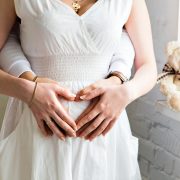
If you’ve decided that 2020 is the year you want to try and start a family, it’s well worth researching some of the things that can affect your fertility – for good or bad – so you can be prepared to counter some of the common fertility challenges and improve your chances of conceiving quickly!
Today we’re taking a look at some of these factors to help you make a start.
Polycystic Ovary Syndrome
This is one of the most widespread fertility challenges in the developed world, with the NHS estimating it affects as many as one in five women in the UK.
When you have PCOS ovulation becomes irregular and hard to predict. If you ovulate less often, then you simply have fewer chances to conceive, and as your cycle becomes irregular you might miss the times when you do ovulate!
PCOS is ultimately driven by your body producing too much insulin, so if you are diagnosed with this condition, it’s worth adjusting your diet to try and compensate. A low-GI diet can help to control the amount of insulin your body produces, and therefore lessen the impact of PCOS on your reproductive system.
Timing
Many women worry about their fertility after the age of 35, but new research indicates this received wisdom may not be accurate, with a much more gentle tail off than previously understood.
More important for when you’re trying to get pregnant is the timing of when you try to conceive! There is a relatively short time in each cycle when you can get pregnant – your ‘fertile window’. Identifying this time (when the lifespan of sperm and freshly ovulated egg overlap) boosts your chances of getting pregnant, and stops you missing an opportunity.
A fertility tracker can help you predict when your fertile window will be, so you can make plans you can rely on.
Lifestyle and Diet
There are lots of small changes you can make to your life to affect your fertility. Lots of fertility diets promise miraculous results, but certain small, sensible steps can have a big effect! Eating more leafy green vegetables – like kale and spinach – gives you a boost for the key nutrients that go into regulating your menstrual cycle and building healthy, fast moving sperm.
Exercise can help to keep you healthy, and reduce the risks associated with pregnancy but it’s important to work out in moderation: subject your body to too much stress, even in a good cause, and it can interrupt your menstrual cycle.
